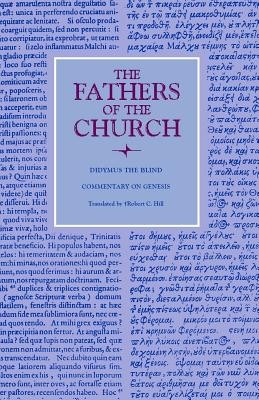
- We will send in 10–14 business days.
- Author: Didymus the Blind
- Publisher: Catholic University of America Press
- ISBN-10: 0813231493
- ISBN-13: 9780813231495
- Format: 14 x 21.6 x 1.4 cm, minkšti viršeliai
- Language: English
- SAVE -10% with code: EXTRA
Reviews
Description
Blind since early childhood, the Egyptian theologian and monk Didymus (ca. 313-398) wielded a masterful knowledge of Scripture, philosophy, and previous biblical interpretation, earning the esteem of his contemporaries Athanasius, Antony of Egypt, Jerome, Rufinus, and Palladius, as well as of the historians Socrates and Theodoret in the decades following his death. He was, however, anathematized by the Fifth Ecumenical Council in 553 because of his utilization and defense of the works of Origen, and this condemnation may be responsible for the loss of many of Didymus's writings. Jerome and Palladius mentioned that Didymus had written commentaries on Old Testament books; these commentaries were assumed to be no longer extant until the discovery in 1941 in Tura, Egypt, of papyri containing commentaries on Genesis, Zechariah, Job, Ecclesiastes, and some of the Psalms.
Certain features of the Genesis commentary, unfortunately not preserved in its entirety, seem to indicate that it may have been Didymus's earliest work. In addition to his silence regarding his other works, remarks on specific heresies as well as Christological interpretations occur much less frequently here than in his Zechariah commentary (previously published in Fathers of the Church Vol. 111). Moreover, the heavier reliance on Philo and Origen may indicate relative inexperience. Whereas Didymus specifically names Philo in this commentary, he never identifies Origen as one of his sources even when quoting the latter verbatim. Like Origen, he rejects anthropomorphic interpretations and proceeds to an allegorical approach when the literal meaning repels him. He does not, however, neglect the literal-historical level; see, for example, his examination of the story of the Flood. All three of Origen's levels of interpretation--literal, moral, and allegorical--are mobilized here. This previously untranslated text is crucial for studies of the fourth century and of the monumental influence of Origen.EXTRA 10 % discount with code: EXTRA
The promotion ends in 22d.18:03:59
The discount code is valid when purchasing from 10 €. Discounts do not stack.
- Author: Didymus the Blind
- Publisher: Catholic University of America Press
- ISBN-10: 0813231493
- ISBN-13: 9780813231495
- Format: 14 x 21.6 x 1.4 cm, minkšti viršeliai
- Language: English English
Blind since early childhood, the Egyptian theologian and monk Didymus (ca. 313-398) wielded a masterful knowledge of Scripture, philosophy, and previous biblical interpretation, earning the esteem of his contemporaries Athanasius, Antony of Egypt, Jerome, Rufinus, and Palladius, as well as of the historians Socrates and Theodoret in the decades following his death. He was, however, anathematized by the Fifth Ecumenical Council in 553 because of his utilization and defense of the works of Origen, and this condemnation may be responsible for the loss of many of Didymus's writings. Jerome and Palladius mentioned that Didymus had written commentaries on Old Testament books; these commentaries were assumed to be no longer extant until the discovery in 1941 in Tura, Egypt, of papyri containing commentaries on Genesis, Zechariah, Job, Ecclesiastes, and some of the Psalms.
Certain features of the Genesis commentary, unfortunately not preserved in its entirety, seem to indicate that it may have been Didymus's earliest work. In addition to his silence regarding his other works, remarks on specific heresies as well as Christological interpretations occur much less frequently here than in his Zechariah commentary (previously published in Fathers of the Church Vol. 111). Moreover, the heavier reliance on Philo and Origen may indicate relative inexperience. Whereas Didymus specifically names Philo in this commentary, he never identifies Origen as one of his sources even when quoting the latter verbatim. Like Origen, he rejects anthropomorphic interpretations and proceeds to an allegorical approach when the literal meaning repels him. He does not, however, neglect the literal-historical level; see, for example, his examination of the story of the Flood. All three of Origen's levels of interpretation--literal, moral, and allegorical--are mobilized here. This previously untranslated text is crucial for studies of the fourth century and of the monumental influence of Origen.

Reviews